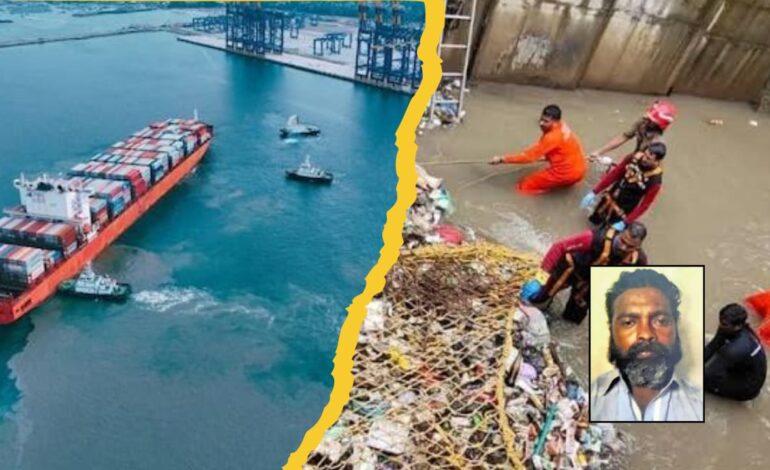
The Thiruvananthapuram Canal tragedy that took the life of one sanitation worker and caused major hardships to scores of others, is not only a humanitarian or administrative mishap, which highlighted the apathy, oversight and negligence at different levels of authority, but also a multidimensional legal issue. UAE based international lawyer Advocate Musthafa Zafeer O.V flags some of the core legal issues involved in the case and points out that not just the governments at the local, State and national levels have responsibility in ensuring the safety of sanitation workers, but the civic society as a whole, needs to take up this responsibility.
Kerala and its Capital City, Thiruvananthapuram, recently celebrated a significant milestone in its developmental history with the completion of the first phase of the Vizhinjam International Sea Port. The arrival of its first mothership drew worldwide attention, marking a moment of pride for the State and underscoring its infrastructural progress as well as possibilities for future development.
However, this triumph was overshadowed just a week later by a troubling issue: poor waste management in the city at the level of multiple government agencies, including wings of the local self-government as well as the regional and national governments. This also raised questions about the responsibilities of the civic society in this crucial sector.
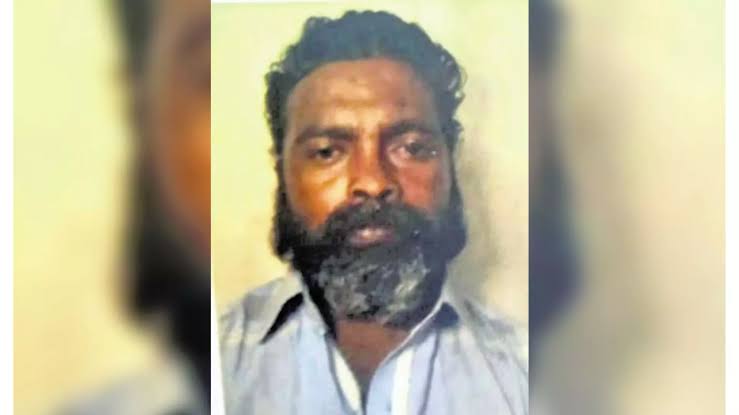
Central to the emergence of this question was the tragic accidental death of Mr. Joy, a daily wage worker involved in waste management clearance. His death highlighted the hazardous conditions faced by the city, and many cleaning workers underscored the urgent need for improved safety and waste management practices in the region. Clearly, Vizhinjam and Joy marked a stark contrast in terms of news. This in turn reflected the ongoing challenges Kerala and Thiruvananthapuram face despite their achievements.
Overview of the Incident
Joy, a temporary sanitation worker, lost his life while attempting to clear waste in a section of the canal managed by Indian Railways. Employed by a private contractor assigned by the Indian Railway Southern Region Office at Thampanoor, Thiruvananthapuram, Joy was tasked with cleaning a 117-metre stretch of the 6.7-kilometer Canal, with the remainder managed by the Thiruvananthapuram Corporation.
The death of Joy while cleaning a section of the Amayizhanjan canal has sparked significant outcry in Thiruvananthapuram and across Kerala. This incident raises critical questions regarding Legal Obligations, Tortious Liability, Civic Responsibility and Public Cleanliness. It is a fact that during the search for Joy’s body, 40 tonnes of waste and debris were cleared from the initial search point, with a similar amount of waste found at the location where his body was eventually discovered. This highlights severe neglect and mismanagement of waste in the canal. This omission or negligence calls for a comprehensive examination of the roles of the Thiruvananthapuram Corporation, Indian Railways, and the general public in contributing to these hazardous conditions.
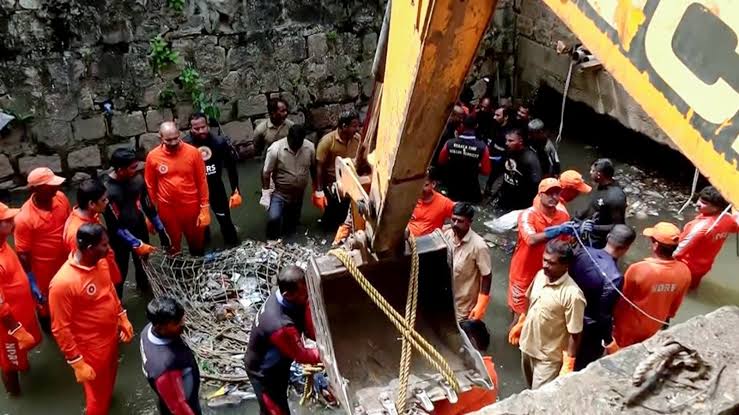
Tortious Liability
The general rule of Tort Liability in Law is that the person who causes damage must pay compensation. In certain cases, however, liability can also arise for Third Parties, referred to as Vicarious Liability.
Indian Railways (Southern Railway)
Indian Railway Authorities contend that maintaining the canal is the Corporation’s responsibility and deny depositing waste in the tunnel area, stating that waste generated during passenger handling is properly cleared from the station itself.
The Southern Railway, the entity in charge of Indian Railways in Kerala State, attributes the root cause of the incident to the piling up of garbage in the Amayizhanjan Canal and. They aver that the tragedy happened not because of their acts or omissions. They claim that the filth and garbage beneath the rail yard were due to indiscriminate disposal in the canal’s other areas controlled or managed by Thiruvananthapuram Corporation.
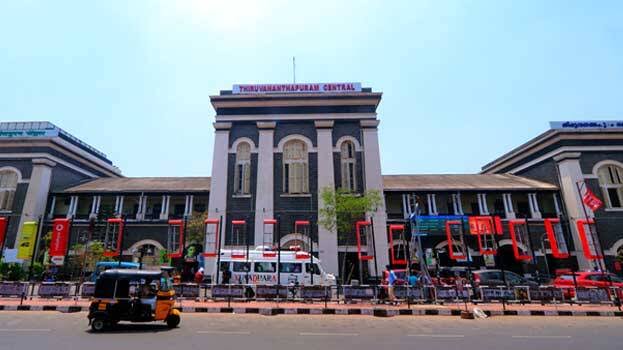
However, they acknowledged taking up the canal’s cleaning work following a request from the Corporation Secretary on June 19 and engaging an experienced contractor from the Irrigation Department for this purpose. According to them the tragic death occurred, While the deceased Joy and other 2 workers were assessing the feasibility of cleaning activities. A sudden increase in water flow (Under Current) due to rains made him slip and he drowned in the muddy waters. Such claims are all okay at the level of defence, but responsibilities of agencies such as the Railways, need to be explored and explained in more concrete legal and ethical terms.
Negligence and Duty of Care:
There are two-fold obligations on the part of Indian Railways which can be summed up as follows.
First, the Indian Railways is obliged not to dump any debris or waste into the canal, and it is obliged to maintain and clean the area owned by them on a regular basis. Second, while assigning the cleaning job it has to ensure that adequate safety measures are taken for the safety of the workers.
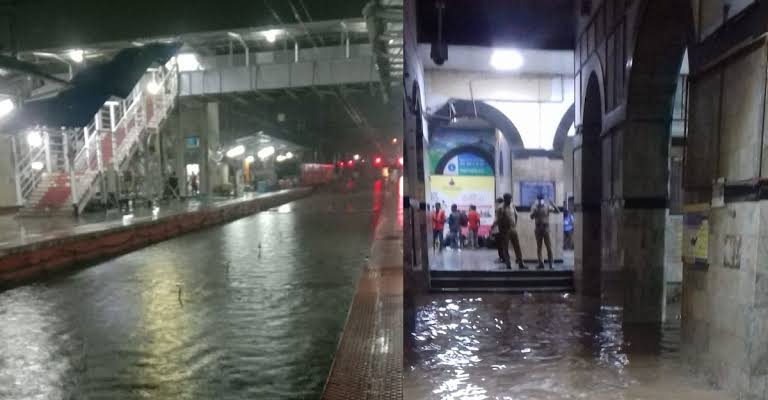
On both grounds, the Indian Railways can be held primarily liable for negligence in the present case. The entity not only failed to take reasonable care on their property, but also of the workers who were engaged in the cleaning job. The contractor for the cleaning work was engaged by Southern Railway HQ, and the deceased, Joy, was a daily wage worker hired by the Contractor along with two others to carry out the job. Evidently, they were assigned without any safety measures.
Contributory Negligence and Public Nuisance: Dumping waste into their section not only contributed to hazardous conditions but also created a public nuisance, potentially leading to the incident.
Failing to maintain their section properly or allowing waste accumulation directly caused the unsafe conditions leading to Joy’s death. If they were aware of hazardous conditions in the Railway-owned section and failed to ensure worker safety or coordinate cleaning efforts, they could be held liable for negligence.
Thiruvananthapuram Corporation
The Corporation claims that it regularly clears debris and has repeatedly requested Indian Railways to maintain their section. It also says that this request was also allegedly neglected. It also argued that despite installing grills and shutters to prevent debris from entering the tunnel, the canal remained in a deplorable state. There are three aspects that challenge the Thiruvananthapuram Corporation’s role.
- Negligence: The Corporation’s negligence is clear in terms of overall canal management and the waste deposits, even if one accepts, as a matter of principle, that the areas where the property belongs to Indian Railways is primarily their responsibility.
- Coordination and Oversight: The Corporation has a duty to ensure public areas are safe. There are allegations that the Waste Collectors engaged by the Corporation themselves are dumping wastes into the canal after collecting from various collection points. There are no mechanisms to make sure that the collected wastes are properly disposed as per the rules and regulations.
- Lack of coordination with Indian Railways might constitute a breach of their oversight responsibilities.
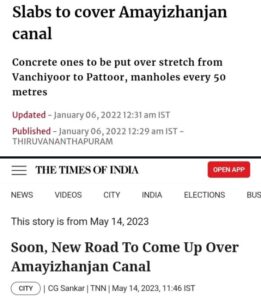
Civic Responsibility
Residents of Thiruvananthapuram
Residents and business owners significantly contribute to improper waste disposal in the canal. Despite some adhering to waste management regulations, the accumulation of waste throughout the canal indicates widespread non-compliance.
- Waste Management Practices: The public plays a significant role in maintaining cleanliness. The waste found during the search underscores improper disposal practices.
- Community Awareness and Participation: Residents have a civic duty to engage in proper waste management and participate in community clean-up initiatives. Public awareness campaigns and educational programs are essential.
The Law
The Prohibition of Employment as Manual Scavengers and their Rehabilitation Act, 2013 (PEMSRA) is a significant piece of legislation in India aimed at eradicating manual scavenging and ensuring the rehabilitation of individuals engaged in such work. The Act criminalizes the practice of manual scavenging and mandates the provision of alternative employment and rehabilitation for those affected.
Applicability in the Thiruvananthapuram Canal Tragedy Case
Context of the Tragedy
In the context of the Thiruvananthapuram Canal tragedy, one must see that in the history of the town, several individuals lost their lives while engaging in manual cleaning of a canal. This incident highlights the dangerous conditions and the continued prevalence of manual scavenging practices despite the legal prohibitions. In the instant case even though it was not a direct case of Scavenging, the nature of the assignment for which the deceased Joy along with other 2 persons were engaged can come under the definition of Hazardous Cleaning as defined under the act.
Section 7 of the Prohibition of Employment as Manual Scavengers and their Rehabilitation Act, 2013 (PEMSRA) is crucial in emphasising the prohibition of hazardous cleaning. Here is the text of Section 7 and its implications:
Section 7: Prohibition of Hazardous Cleaning of Sewers and Septic Tanks
“No person, local authority or any agency shall, from such date as the Central Government may, by notification, specify, engage or employ, either directly or indirectly, any person for hazardous cleaning of a sewer or a septic tank.”
Key Points
- Total Prohibition: This section strictly prohibits any person, local authority, or agency from engaging or employing individuals for hazardous cleaning tasks related to sewers and septic tanks.
- Effective Date: The prohibition comes into effect from a date specified by the Central Government through a notification.
- Direct or Indirect Employment: The prohibition covers both direct and indirect employment, ensuring that even subcontractors or intermediaries cannot employ individuals for hazardous cleaning.
Implications
- Legal Accountability: Violating this prohibition can result in legal consequences for individuals, local authorities, or agencies involved in such practices.
- Encouragement of Safe Practices: The section promotes the use of safe and mechanized cleaning methods, reducing the health risks faced by sanitation workers.
- Reinforcement of Dignity: By prohibiting hazardous cleaning, the Act aims to protect the dignity and rights of sanitation workers, ensuring they are not subjected to inhumane and dangerous working conditions.
Section 7 of the PEMSR Act, 2013, thus plays a vital role in the eradication of unsafe manual scavenging practices, ensuring the health, safety, and dignity of sanitation workers.
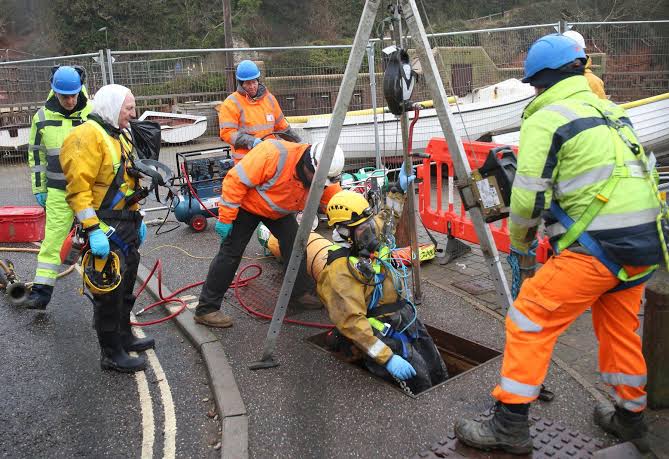
Definition of ‘Sewer under PEMSR Act 2013
Under the Act “Sewer” is defined as: “an underground conduit or pipe for carrying off drainage water and waste matter, including human excreta.” This definition encompasses all forms of underground systems designed to carry away waste and sewage, emphasizing the hazardous nature of work associated with these structures.
Definition of Hazardous Cleaning under the Act
As per the PEMSR Act “Hazardous cleaning” means cleaning by an employee, in such manner as may be prescribed, of a sewer or a septic tank or a railway track or any other such space or premises, by manual means, without the use of protective gear and other cleaning devices.
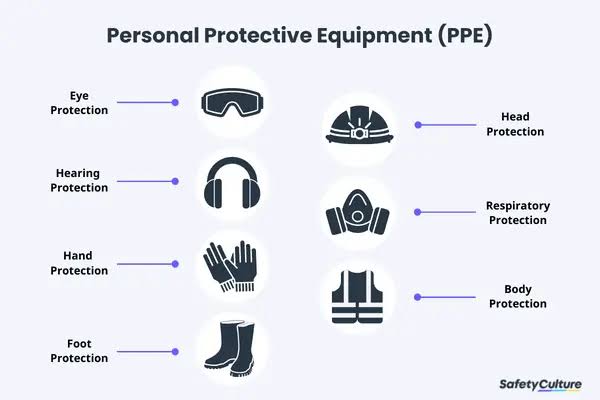
Key Elements
- Manual Cleaning: The act of cleaning sewers, septic tanks, railway tracks, or similar spaces by hand, rather than using mechanical or automated methods.
- Lack of Protective Gear: Performing cleaning tasks without the appropriate protective equipment, which exposes the worker to serious health risks.
- Specific Environments: The environments specified (sewers, septic tanks, railway tracks) are particularly noted for their hazardous conditions, often containing toxic gases, harmful pathogens, and other dangerous substances.
Implications
- Prohibition: The Act prohibits hazardous cleaning as it endangers the health and safety of workers.
- Employer Responsibility: Employers are required to ensure that cleaning of such environments is carried out using mechanized systems and that workers are provided with adequate protective gear if manual intervention is unavoidable.
- Legal Consequences: Engaging workers in hazardous cleaning without compliance with safety regulations can result in penalties, including fines and imprisonment, for those responsible.
Objectives of the Definition
- Protect Worker Health: The definition aims to safeguard the health and lives of workers by ensuring they are not exposed to hazardous conditions without proper protection.
- Promote Mechanization: Encourages the use of modern, safer, and more efficient cleaning technologies to replace manual scavenging.
- Enforce Accountability: Holds employers and authorities accountable for ensuring safe working conditions and adherence to the law.
The inclusion of hazardous cleaning in the PEMSR Act highlights the commitment to eradicating unsafe manual cleaning practices and improving the working conditions and dignity of individuals engaged in sanitation work.

Key Provisions of PEMSR Act, 2013
- Prohibition of Manual Scavenging: The Act strictly prohibits the employment of individuals as manual scavengers, which includes any form of manual cleaning of human excreta in insanitary latrines or open drains.
- Punitive Measures: The Act prescribes penalties for those who employ manual scavengers, including imprisonment and fines.
- Mechanized Cleaning: The Act promotes the use of mechanized systems for cleaning drains and sewer lines to eliminate the need for manual scavenging.
Applicability of PEMSR ACT 2013 to the Thiruvananthapuram Case
- Violation of Prohibition: If individuals were engaged in manual cleaning of the canal, this constitutes a direct violation of the PEMSR Act. Those responsible for employing these workers can be held accountable under the law.
- Negligence and Liability: The authorities or contractors involved in assigning manual scavenging tasks may be subject to legal action for negligence and violation of the Act.
- Rehabilitation Efforts: There should be an immediate assessment of the affected individuals and their families to provide necessary rehabilitation as mandated by the Act, including compensation and alternative employment.
- Awareness and Implementation: The tragedy underscores the need for better awareness and stringent implementation of the PEMSR Act in Thiruvananthapuram and other regions to prevent such incidents.
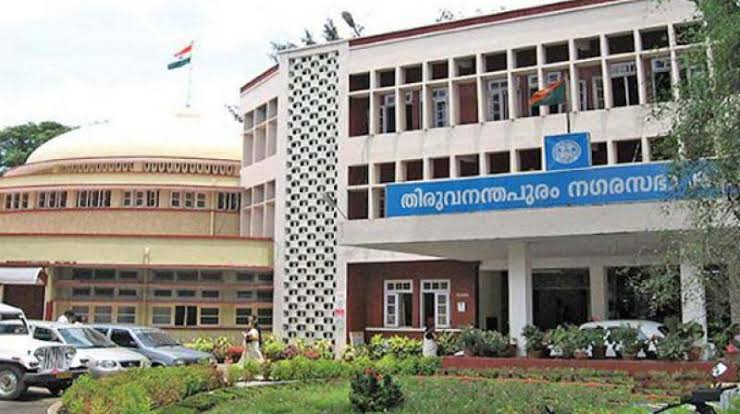
Investigation and Accountability
- Investigation for Accountability: There is a call for a thorough investigation to identify and hold accountable those who violated the law by employing individuals for manual cleaning.
- High Court’s Intervention: The High Court of Kerala has appointed an Amicus Curiae (a friend of the court) to conduct a detailed inquiry into both the causes of the accident and the condition of the canal. This indicates judicial care as well as the seriousness of the issue. The involvement of the High Court and the appointment of an Amicus Curiae demonstrate the judiciary’s active role in ensuring justice and adherence to laws protecting manual workers. Also Such investigations can lead to the identification of systemic issues and the implementation of preventive measures to avoid future incidents.
Compensation Already Declared for Joy’s Family and Supreme Court Judgement on the Compensation Payable in such cases:
The Government of Kerala has already declared a compensation of INR 10 Lakhs, and the Thiruvananthapuram Corporation has announced that they will build a house for the family of the deceased, Joy. Meanwhile, Indian Railways has remained silent on the matter.
It may be noted that, The Supreme Court of India recently enhanced the compensation payable to families of manual scavengers who die while cleaning sewers or septic tanks. In a landmark decision, the Court increased the compensation from INR 10 Lakhs to INR 30 Lakhs. Additionally, for those who suffer permanent disabilities due to such hazardous work, the minimum compensation has been set at INR 20 Lakhs, and for other injuries, up to INR 10 Lakhs.
The Court’s decision was delivered in the case of Dr. Balram Singh vs. Union of India, which highlighted the persistent and inhumane conditions faced by manual scavengers despite existing legal prohibitions. The bench, comprising Justices S. Ravindra Bhat and Aravind Kumar, issued 14 directives to ensure the effective implementation of the Prohibition of Employment as Manual Scavengers and their Rehabilitation Act, 2013.
The decision underscores the Court’s commitment to upholding the dignity and rights of manual scavengers, emphasizing the constitutional guarantees of equality and non-discrimination under Articles 15, 17, 23, and 24.
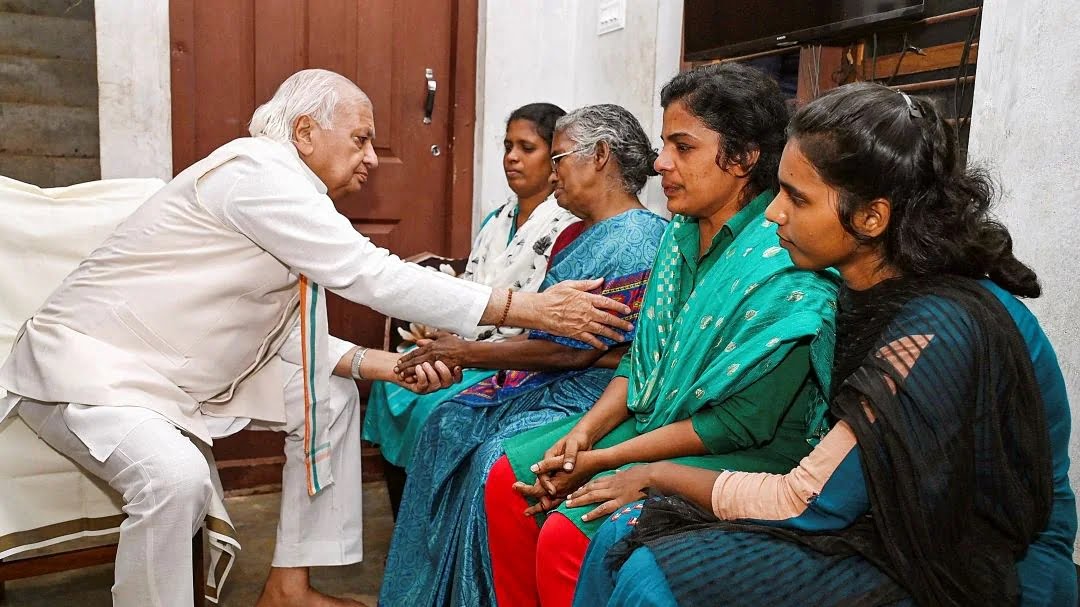
Going Forward
- Policy and Enforcement: Strengthening policies and enforcement mechanisms related to waste management is crucial.
- Public Participation: Encouraging public participation in maintaining cleanliness can significantly improve the situation.
- Clear Communication and Coordination: Establish clear communication channels and coordination mechanisms between the entities.
- Public Awareness Campaigns: Launch comprehensive campaigns to educate residents about proper waste disposal practices.
- Community Clean-Up Programs: Organize clean-up programs and encourage resident participation.
- Improved Waste Management Infrastructure: Invest in better waste management infrastructure to reduce improper disposal.
Acknowledgment of Rescue Efforts
A big salute is due to the rescue workers, including 50 personnel from the Kerala Fire and Rescue Services, Kerala Police and scuba divers, who plunged into the dangerous mud water to carry out the search.
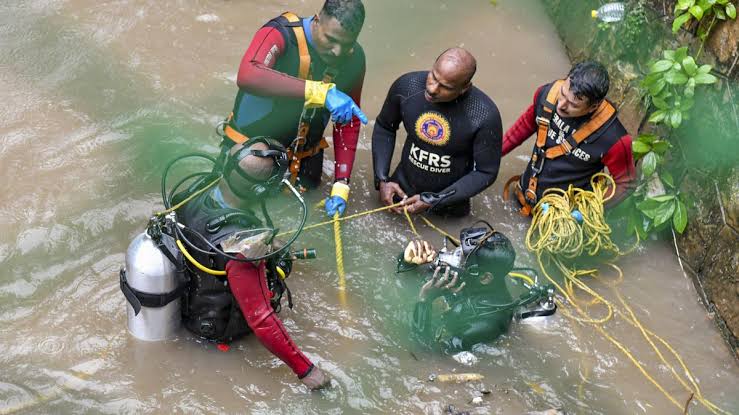
They should be properly rewarded and given the necessary medical attention, as they spent almost 46 hours in the canal searching for the body.
Thiruvananthapuram: Housing Top Brasses and Who’s Who of the State
The city corporation spans 214.86 km², divided into 100 wards, each represented by elected councillors, serving a population of 957,730. It encompasses the Legislative Assembly constituencies of Thiruvananthapuram, Vattiyoorkavu, Nemom, Kazhakkoottam, and five wards of the Kovalam constituency. This structure includes 5 MLAs and 100 councillors representing nearly 1 million residents.
Thiruvananthapuram, as the capital city of Kerala, houses the top echelons of the state government, including ministers and bureaucrats. The Southern Railway Headquarters is also located in Thiruvananthapuram, with many high-ranking officials residing in the city.
Conclusion
The Thiruvananthapuram Canal tragedy serves as a grim reminder of the urgent need to enforce the provisions of the PEMSR Act and to safeguard the lives and dignity of individuals who are still subjected to such hazardous and dehumanising work.
The death of Joy and the discovery of massive waste accumulation in the Amayizhanjan canal highlight serious lapses in waste management and civic responsibility in Thiruvananthapuram. Addressing these issues requires a multifaceted approach involving the State Government, District Administration, Corporation, Indian Railways, and the General Public. By fostering a culture of cleanliness, accountability, and collaboration, a safer and more sustainable environment can be created for all residents.




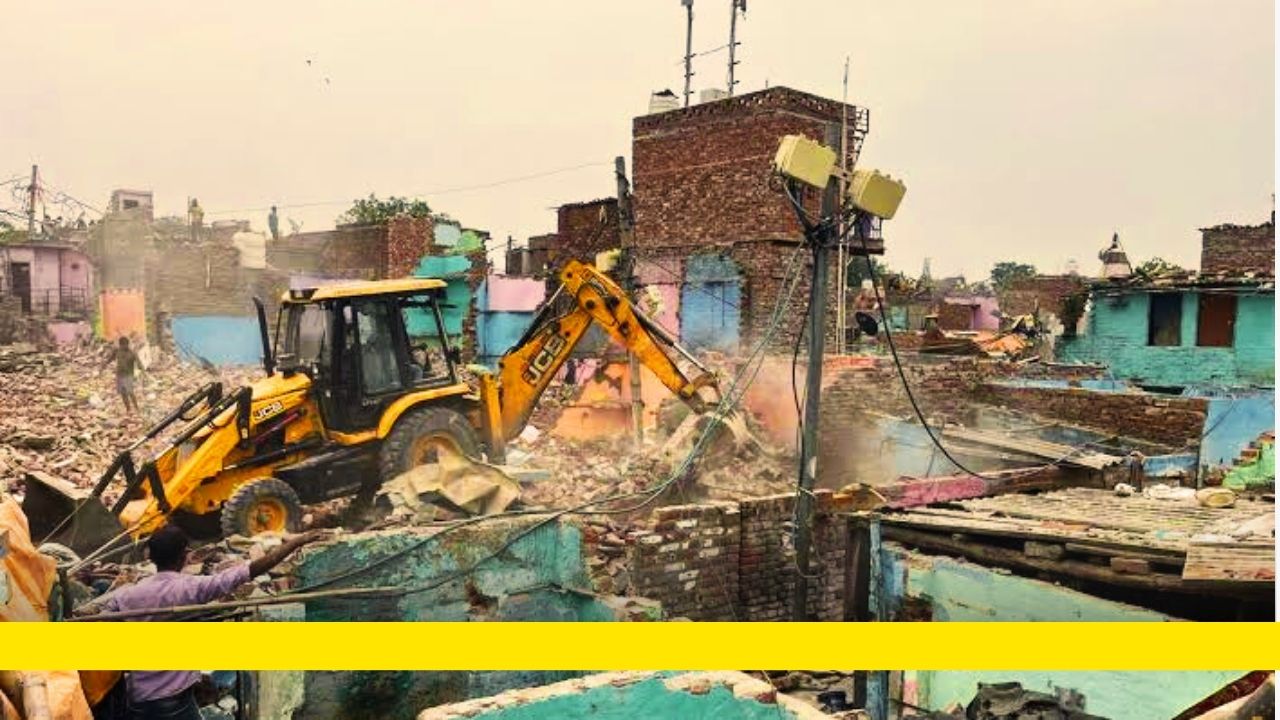







A laborious read , but important all the same .. Thank you for highlighting these legal points and emphasising the responsibility of the civic society in preventing such disasters
കാലിക പ്രസക്തിയുള്ള ഒരു വിഷയത്തേക്കുറിച്ച് അതിൻ്റെ ഗൗരവം ഒട്ടും ചോർന്നുപോകാതെ സാമുഹ്യപ്രതിബദ്ധത ഏറ്റെടുത്തു കൊണ്ട് രാജ്യത്ത് ജീവിക്കുന്ന ഒരു പൗരൻ എന്ന നിലയിൽ സമുഹത്തിൽ അധികൃതരുടെ അശ്രദ്ധ മൂലം സംഭവിക്കുന്ന സംഭവവികാസങ്ങളെ പ്രതിഷേധാത്മകമായ രീതിയിൽ നേരിൻ്റെ പക്ഷത്ത് നിന്ന് കൊണ്ട്
Adv. മുസ്തഫാ സഫീർ മനോഹരമായി
എഴുതിയിരിക്കുന്നു…
തിരുവനന്തുപരത്ത് സംഭവിച്ച തികച്ചും അസാധാരണവും,
സംഭവിക്കാൻ പാടില്ലാത്തതുമായ കാര്യങ്ങൾ ഇനി ആവർത്തിക്കാതിരിക്കാൻ
വേണ്ടുന്ന നടപടികൾ കോർപ്പറേഷനും,
റെയിൽവേയും, സർക്കാരും
കൈക്കൊള്ളുവാൻ അങ്ങയുടെ ഈ ലേഖനം ഉപകരിക്കും എന്നുള്ള കാര്യത്തിൽ തർക്കമില്ല..
ആനുകാലികമായ ഇത്തരം വിഷയങ്ങൾ നിയമത്തിൻ്റെ പിൻബലത്തിൽ സാധാരണ ജനങ്ങൾക്ക് മനസ്സിലാകുന്ന ഭാഷയിൽ അവതരിപ്പിക്കാൻ കഴിഞ്ഞു എന്നതാണ് ലേഖനത്തേ കൂടുതൽ ശ്രദ്ധേയമാക്കൂന്നത്..
ഒരു ജനാധിപത്യ വ്യവസ്തിതി നിലനിൽക്കുന്ന രാജ്യത്ത് ജനങ്ങളുടെ ജീവനും സ്വത്തിനും സംരക്ഷണം കൊടുക്കാൻ ബാധ്യതയും ഉത്തരവാദിത്വവുള്ള ഭരണകൂടം തങ്ങളുടെ ചുമതലകളിൽ വീഴ്ച വരുത്തുമ്പോളാണ് ഇത്തരം സംഭവങ്ങൾ ഉണ്ടാകുന്നത്.
എന്നാൽ സംഭവിച്ച കാര്യങ്ങളിൽ സർക്കാർ പുലർത്തിയ സമിപനം ഒട്ടും
ആശ്വസജനകമായിരുന്നില്ല എന്നതാണ് വസ്തുത..
I am really shocked to see this happening in Kerala. I really thought such issues were less likely to occur here. It’s surprising and disappointing to see this kind of situation in a state known for its progressive values. We need to address this urgently and ensure it doesn’t happen again